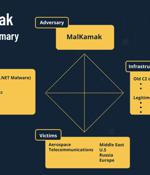Security News

A group of hackers that security researchers call LightBasin has been compromising mobile telecommunication systems across the world for the past five years. LightBasin is active since at least 2016 and targets Linux and Solaris servers in particular, although it did interact with Windows systems where needed, in their mission to steal subscriber information and call metadata.

Details have emerged about a new cyber espionage campaign directed against the aerospace and telecommunications industries, primarily in the Middle East, with the goal of stealing sensitive information about critical assets, organizations' infrastructure, and technology while remaining in the dark and successfully evading security solutions. "The ShellClient RAT has been under ongoing development since at least 2018, with several iterations that introduced new functionalities, while it evaded antivirus tools and managed to remain undetected and publicly unknown," researchers Tom Fakterman, Daniel Frank, Chen Erlich, and Assaf Dahan said in a technical deep dive published today.

Published by Cybereason, the report said that it found evidence of three different clusters of attacks going back to at least 2017, all perpetrated by groups or individuals connected in some way to advanced persistent threat groups Soft Cell, Naikon and Group-3390, which have each operated for the Chinese government in the past. Cybereason said it believes the goal of the attacks was to established continuous access to telecom provider records "And to facilitate cyber espionage by collecting sensitive information, compromising high-profile business assets such as the billing servers that contain Call Detail Record data, as well as key network components such as the Domain Controllers, Web Servers and Microsoft Exchange servers."

Britain's Telecoms Security Bill will be accompanied by a detailed code of practice containing 70 specific security requirements for telcos and their suppliers to meet, The Register can reveal. The Telecom Security Bill, which is near the end of its journey through Parliament, has been rather unpopular with some ISPs who have previously complained about the high cost of compliance.

Three distinct clusters of malicious activities operating on behalf of Chinese state interests have staged a series of attacks to target networks belonging to at least five major telecommunications companies located in Southeast Asian countries since 2017. The Boston-based cybersecurity firm linked the campaigns to three different Chinese threat actors, namely Gallium, Naikon APT, and TG-3390.

A previously undocumented Chinese-speaking threat actor is targeting Microsoft Exchange vulnerabilities in an attempt to compromise high-profile victims, Kaspersky reveals. According to Kaspersky, the toolset emerged as early as July 2020, with the threat actor targeting various entities in Southeast Asia, including governmental organizations and telecom companies.

Fujitsu is collaborating with the Telecom Infra Project OpenRAN Project Group to accelerate adoption of open radio access network infrastructure, helping service providers speed new 5G services to market at reduced costs. With commercial 5G deployments gaining momentum worldwide, an increasing number of network service providers are embracing Open RAN technologies to take advantage of greater component choice, reduced costs and improved network performance.

Source Photonics announced a range of 800G optical transceivers for datacenter and telecom applications during the OFC 2021 virtual event. As the initial wave of widescale deployment of 400G is taking place in datacenters, hyperscale datacenter customers are already looking into 800G and beyond, together with the release of 25.6T switching ASIC, to further support the increasing demand for bandwidth-intensive applications.

Benu Networks announced that its Secure Access Service Edge solution now supports the Telecom Infra Project's OpenWiFi Controller with the ability to manage OpenWiFi compliant third party Wi-Fi access points. Benu Networks' Remote Workforce and Enterprise SASE solutions make it easier than ever to secure network traffic, dynamically launch services, and manage the TIP OpenWiFi family of Access Points.

China-linked cyber-espionage group Mustang Panda is targeting telecommunications companies in Asia, Europe, and the United States for espionage purposes, according to a warning from security researchers at McAfee. The new malware attacks, McAfee says, employ the same tactics, techniques and procedures previously associated with Mustang Panda.